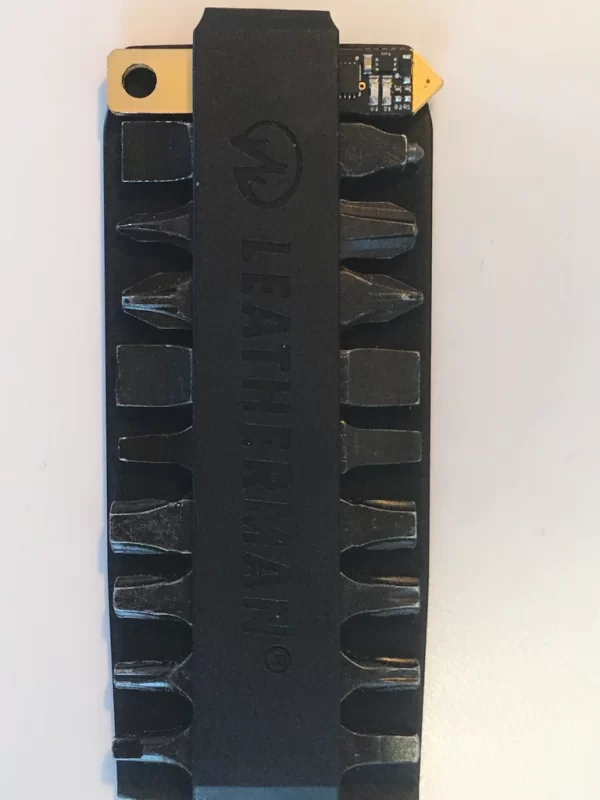
UPDATE – Read our full Volty voltmeter review.
NEWS – Garrison Keillor once said, “The curse of the handyman [or person] is that when someone asks you to look at something, they really don’t want you to just look at it – they want you to do something about it.”
I’m that guy with my family and friends and have long searched for a meter I can add to the EDC in my pocket along with my trusty Leatherman multi-tool. The small company PC Doodle has made my dream one step closer with their “Volty.”

Measuring about the same size as a Leatherman flat bit, this tiny device can be carried on a keychain, buried in a pocket (be careful not to lose it!), or occupy a ¼” bit socket.

Using keys or the body of a multitool to bridge a low-voltage (2 to 30VDC) circuit, the Volty will flash a pattern indicating the voltage accurate to 0.1 volts.

Volty only measures DC voltage, but the size simply can’t be beaten! Very cool! I will be following this news article with a full review in the coming days. You can get one of your own for $25 from PC Doodle.
Update 4/2/2022 – Read my Volty review.




Gadgeteer Comment Policy - Please read before commenting
How does $25 turn to $65 on checkout?
James, not sure why you’re seeing that. I just went to their site and did a pretend order and it was only $25.
I’m gonna wager that you clicked on the advertisement for the “gadget box” and not the link to the PCPoodle web store where the item is actually sold. lol
This should probably be called a “battery tester” instead of a “voltmeter” since it looks like this adds a small (undefined) load to the circuit when testing. All the examples involve testing batteries so that is obviously the primary application, and putting a load on the battery is a good feature to have for more accurate battery readings, but it will likely introduce voltage errors if trying to measure other circuits. It also needs to draw power from the battery it’s testing, which is necessary for such a package size, but limits it’s use, so calling it a “voltmeter” could be a little misleading. I would be very interested to see the schematic for this, though I’m sure it is proprietary. All in all, it looks like a very interesting product, though, and a worthwhile addition to any handyman’s EDC!
It’s a voltmeter because the load is pretty tiny. A good battery tester puts a significant load in to see how the battery is actually able to keep up. Too high internal resistance (weak battery) would show up when testing at a high enough load.
Ok, you’re testing voltage on a car battery. How does the current not flow into your hand where you are holding the multitool?
Shocking, I know.
The person who feels they need a voltmeter on hand at all times, and can remember the secret morse code result from this one, is probably smart enough to put the metal part that they are touching to the negative terminal. This would be the same potential as touching any metal part of the car and therefore not shocking at all.
MC, I’m just here to salute you about your name. Thank you for the giggle. I shall leave now.
The secret Morse code is:
green = 10V
yellow = 1V
red = 0.1V
just add up the flashes. The trick is to interpret the resulting value.
Another smart person would realize that you can complete a 12V car battery circuit with your body with no ill effects, since you’re body’s resistance is too high to allow any damaging current, and the voltage is low enough not to change the dielectric properties of your skin.
Are you implying that you have been “shocked” by touching the terminals on a car battery? Not likely, unless you’re touching both terminals with your tongue!
LOL, I just sent Julie an email on this on Monday, because I just saw about it! Timing is everything!
Dammit! Thanks for helping me spend $25!
Just got mine in the mail. Great piece of kit!